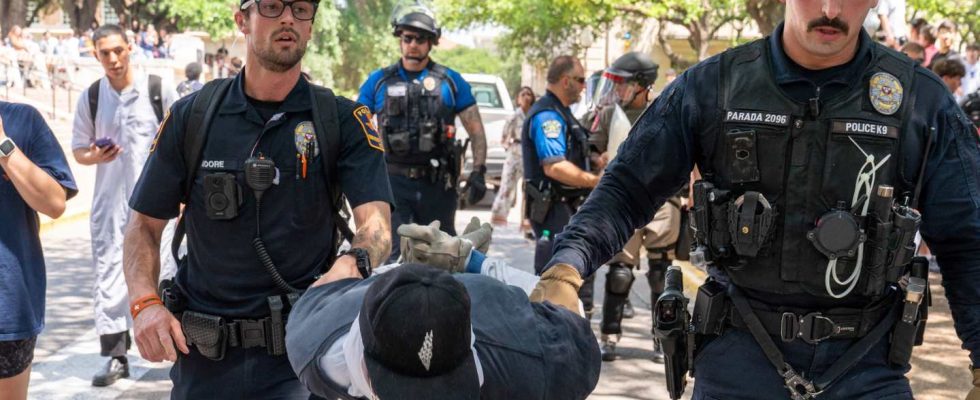We are witnessing the culmination of a months-long effort by universities to smother pro-Palestinian activism.
A pro-Palestinian protester is arrested at the University of Texas in Austin on April 29, 2024.
(Suzanne Cordeiro / AFP via Getty Images)
This piece was written by Alaa Hajyahia, Rachel Vogel, Saifeldeen Zihiri, Chloe Miller, Mehrdad Dariush, Chisato Kimura, Alaa Hachem, and Andrew Rikard, all of whom are students at Yale Law School.
Over the past two weeks, US college campuses have erupted in the largest wave of pro-Palestine student activism since Israel’s latest war on Gaza began in October 2023. Columbia University—where, earlier this week, students began occupying campus buildings—was the spark that fired the nationwide movement. It was also the site of some of the first waves of administrative and police repression that followed in the movement’s wake. But it was hardly the first time over the past seven months that students found themselves targeted for their support of Palestine.
In fact, Columbia has been cracking down on pro-Palestinian activism almost continually since October, including in the weeks before the first Gaza Solidarity Encampment sprang up. At the beginning of this month, Columbia President Minouche Shafik suspended and evicted four students following an event the administration deemed unauthorized. Shafik then testified before the congressional committee that previously brought down former Harvard President Claudine Gay. She happily bent to the cynical Republican weaponization of antisemitism, issuing repeated condemnations of her own students and faculty.
Columbia was no outlier. Vanderbilt expelled and suspended students for a March 26 sit-in. On the same day, Stony Brook administrators ordered the arrest of nine demonstrators for a sit-in. On April 5, Claremont Police in riot gear arrested 20 student activists during a peaceful occupation of an administrative building at Pomona College.
The pattern is clear. Not only have universities across the country resorted to student suspensions and violent arrests in recent weeks, but they have also been heavily repressing pro-Palestinian activism for months.
As law students, lawyers, and legal scholars, we are deeply troubled by this. Historically, anti-colonial struggles have been aided by supportive arguments from the metropole. The capacity of these arguments to prevail, in turn, depends on our access to open and substantive dialogue. To our alarm, the conditions necessary for these arguments have become increasingly scarce.
Since Israel’s assault on Gaza began, there has been a systematic restriction and criminalization of pro-Palestine political action and speech, rendering transnational solidarity highly costly for many of those who wish to speak out against such injustices. In large part, this is because US universities—law schools included—have turned their backs on their claimed commitment to free speech. They censor pro-Palestinian voices ostensibly in the name of campus safety and anti-discrimination, civil discourse, and adherence to facially neutral bureaucratic measures that we find unfairly restrictive and asymmetrically applied.
Current Issue

The forces acting against Palestinians are transnational: They seek to legitimize Israeli atrocities by controlling the narrative and pressuring the most vulnerable US campus voices: those of students and early-career scholars. These alarming developments also undermine any semblance of adherence to the rule of law. The silencing tactics employed by our institutions to chill student solidarity with Palestine erode legal norms by undermining campus free speech rules and academic due process. These tactics have spread on a national scale, with administrators enlisted to punish their students who dare to speak out.
One way that university administrators enact this repression is by ideologically isolating the pro-Palestinian position and endorsing narratives that depict pro-Palestinian speech as hateful and violent. At Harvard, for example, now-ousted President Gay condemned student activists’ use of the common slogan “from the river to the sea, Palestine will be free”—a demand for equal rights for all people in historic Palestine—as a call for the “eradication of Jews from Israel.” At Syracuse University, an administrator threatened students with disciplinary action over a sign that read “Globalize the Intifada” under a similar misrepresentation, arguing that the slogan amounted to discrimination in violation of Title VI of the Civil Rights Act of 1964. Most recently, the University of Southern California canceled valedictorian Asna Tabassum’s commencement speech due to “substantial risks relating to security and disruption” after pro-Israel groups criticized Tabassum for a pro-Palestine link on her Instagram profile. USC has now canceled its main commencement entirely.
Such blanket policing of Palestinian solidarity slogans does not make campuses safer. They are meant to produce a chilling effect, stifling discourse and disallowing viewpoints considered unacceptable by the administration and those who exert control over it.
Furthermore, many of the students most vocally supportive of Palestinian rights are racialized and working-class. These students are therefore more vulnerable to punitive practices that aim to obstruct their access to financial stability after graduation. As a result, students who speak up risk backlash from prospective employers, and many more feel pressure to self-censor in order to self-preserve.
These are not idle threats. For instance, we have seen a large wave of repression in our field. Law firms like Foley & Lardner, Winston & Strawn, Davis Polk, and Sidley Austin have rescinded job offers for candidates who expressed pro-Palestinian views. Such is the impulse to strike out pro-Palestine support that law firms have even withdrawn offers simply because of candidates’ membership in affinity groups or other campus organizations that signed collective letters criticizing the Israeli occupation’s role in fueling the conditions that led to the attack on October 7.
Rather than resist such pressure, law school administrators fell silent, thereby giving the green light to any future employers tempted to infantilize and bully law students based on their political views. This concerning tactic persists, as various affinity groups continue to report receiving communications from firms, warning them that their funding is conditional upon a disavowal of pro-Palestine political stances. Administrators have been silent on these more recent threats as well.
Astonishingly, academics have also joined in. On October 17, 2023, a Berkeley Law professor publicly accused student groups of antisemitism for supporting an academic boycott of Zionist speakers and urged law firms not to hire any of his students who supported that position. While the Berkeley Law dean then attempted to distance himself from his colleague’s message, he still saw fit to publicly decry anti-Zionist speech on his campus. Yet again, his was a narrative that conflated legitimate pro-Palestinian views with antisemitism in order to justify institutional condemnation. While claiming not to ignore “the plight of Palestinians,” the dean’s essay amounted to a refusal to support dialogue on Israel/Palestine unless the entire university community acquiesced to the legitimacy of the political project of Zionism. These tactics attempt to place anti-Zionist ideas outside of the bounds of ideological permissibility.
The extent of the hostility to pro-Palestine speech on campus is so deep that even those administrators willingly enlisted to silence it are not safe from threats of sanction if their attempts are not deemed forceful enough. Ask Claudine Gay, who was forced to resign as Harvard president in January 2024. Recall that Gay had chosen to publicly participate in the repression by denouncing the slogan “from the river to the sea” on her campus, refusing to condemn the targeted doxxing and harassment of her pro-Palestine students (many of whom are Palestinian, Black, Arab, South Asian, Muslim, undocumented, and/or foreign), and resisting dialogue with them. But she ultimately became the target of the same racist forces that work to isolate pro-Palestine activism in their frantic bid to break solidarity. As Aaryan Morrison insightfully explained, none of Gay’s efforts were enough to satisfy her Zionist and conservative challengers. Their dismissal and patronization of Gay was reminiscent of Gay’s own tactics toward her pro-Palestine students. Congress extended not an invitation for dialogue but for a discursive trap orchestrated to sacrifice Gay in order to signal to administrators at schools far less powerful than Harvard what they must do to their students to escape scrutiny. In the words of one Palestinian-American student-organizer at Harvard Law School, Gay “actively harmed us, and she was forced to resign for not harming us more.”
Alongside outright condemnation, university administrators have selectively applied and manipulated bureaucratic rules to crush pro-Palestine student activism. From a safe distance, these measures often look impartial and reasonable. But when we consider that they are systematically leveraged in ways that support a pro-Israel ideological position and serve to shut down pro-Palestinian discourse, it becomes clear that they are far from neutral.
To date, Brandeis, Rutgers, Columbia, George Washington, Yale, Pennsylvania, Harvard, and Syracuse, among other schools, have altered or selectively enforced bureaucratic rules on free expression to prevent student Palestine solidarity on their campuses. These institutions have shut down pro-Palestine student groups, canceled pro-Palestine events, and even suspended or arrested students for their activism. On November 9, 2023, Columbia suspended recognized student groups Jewish Voice for Peace (JVP) and Students for Justice in Palestine (SJP) for “repeated violations of event policies” following a peaceful protest on campus. Columbia deemed the demonstration an “unauthorized event” and claimed that it included “threatening rhetoric and intimidation,” thus justifying the punitive action. Administrators conditioned reinstatement on JVP and SJP demonstrating compliance with university policies and group leaders consulting with school officials in the future.
Columbia’s suspension of JVP and SJP demonstrated the vulnerability students have to bureaucratic tactics aimed at suppressing forms of solidarity that the administration deems undesirable. When pro-Palestine student organizers drew crowds large and frequent enough to threaten the university’s pro-Israel position, Columbia created a special committee convened to amend the rules for student groups, in violation of its own procedures. Despite the opposition of the Columbia Student Governing Board and university Senate to the revisions, the administration maintained the suspensions in its capacity as the ultimate arbiter of student expression on campus. These suspensions are still in place, and will remain so as long as Columbia’s administration defers to the outside pressures demanding it continue to punish its students for speaking up against genocide. These restrictions have not, however, prevented Columbia SJP and JVP from continuing their activism as unsanctioned groups—and with far more power and effectiveness than before.
To see how these bureaucratic restrictions operate over time, we can look to our own institution, Yale Law School, which has been gradually tightening its “civil discourse” criteria. Yale Law has constrained student speech to one physical space called “The Wall,” a section of the school’s corridor where a student may display their political opinions on a personally signed and dated single sheet of paper not exceeding 11 by 17 inches.
The law school first sought to tame the legacies of the radical campus activism of the 1960s by devising, decades later, this centralized, physical space where law students could publicize their political opinions in a controlled environment. Then, just as now, the law school administration dictated the criteria for “permissible speech” under its civil discourse framework. Disruption of everyday life—an inherent part of protest—became impermissible and subject to disciplinary measures.
Popular
“swipe left below to view more authors”Swipe →
Students tested the limits of Yale Law’s civil discourse framework in March 2022, when they lined the school’s hallways with posters calling for a boycott of iTrek, a trip to Israel organized to expose American students to the Zionist narrative and whitewash Israel’s systematic dispossession of Palestinians. In response to the iTrek poster campaign, and to a previous attempt by law students to line the school’s hallway with posters protesting an anti-LGBTQ speaker’s invitation to campus, the law school administration revised its poster policy with further restrictions. The administration updated its policy again in January 2024 in response to the current wave of pro-Palestine activism, increasing the weight of the tedious bureaucratic requirements.
If freedom of speech is to mean anything on US college campuses, it must inevitably embrace the controversial, the uncomfortable, and the inconvenient. But we are now witnessing administrative micromanagement of “free” speech. University administrators create bureaucratic restrictions and rules ad hoc to police student speech. Meanwhile, those same administrators refuse to protect people who are targeted and harassed for their support of Palestinians.
The apparent rationale for this is that the students who express pro-Palestine views constitute a liability that needs to be removed. But these actions amount to de facto modifications of schools’ free speech policies—ones that enable university administrators to engage in arbitrary censorship when they see fit.
Israel’s devastation of Gaza has overshadowed this academic year. Our generation’s historical consciousness has sharpened, as we continue to view the atrocities livestreamed to us by resilient Palestinians thousands of miles away. The decision of university administrators to turn away from their claimed commitment to free speech when it comes to Palestine is precisely what compels us to insist upon open academic dialogue on our campuses. And it has also driven many students to turn to activism.
As the scope and strength of the campus demonstrations grow, the threat of disciplinary action and arrest for an increasingly mobilized and energized student body falls. Although students at many Gaza solidarity encampments have faced arrest and suspension already, they have returned to rebuild them. More encampments continue to pop up each day, even abroad. These manifestations of cross-campus solidarity join together in transnational solidarity with Palestinians in Gaza, who have seen all of their universities destroyed during Israel’s current onslaught.
University administrators carry a heightened duty to protect all students during such sensitive times. A duty to protect, however, should not be manipulated to favor some students over others. It certainly should not be manipulated to support the ideological position advanced by Congress and the pro-Israel forces pressuring college campuses.
Academic institutions claim to foster environments for the free exchange of ideas toward social advancement. If so, they should not impede students from, as Yale Law describes it, “putting ideas into action to make a positive difference in our communities, across the country, and in every corner of the globe,” including in Palestine.
To our current teachers and administrators, we say this: Do not leave as your institutional legacies resounding silence and repression during a genocide. We also call on university administrators—law schools in particular—to recognize their unique responsibility to affirm the rule of law. We insist that law schools affirmatively protect those who speak out against the oppression of Palestinians in pursuit of these schools’ articulated commitments to justice and equality under the rule of law. In addition, we invite faculty to use their influential platforms and privileges of tenure to amplify the volume of student solidarity with Palestine.
Many professors have already expressed solidarity by using their positions to write articles, sign letters of support for Palestinian rights, contribute to amicus briefs, and challenge their universities’ increasingly draconian policies. They have also actively fought against censorship and discrimination, demonstrating the crucial role faculty play in upholding principles of free speech and fair dialogue. More recently, NYU faculty encircled the encampment to protect their students from arrest, and Columbia faculty walked out in solidarity with their arrested students. By leveraging their academic influence and their institutional standing, these professors not only serve as vital advocates in the struggle for justice for Palestinians but also model inspirational leadership in a transformative historical moment.
After Columbia cleared the first Gaza Solidarity Encampment, the size of the demonstration only grew, in defiance of the rules promulgated to stop it. The commitment of students to protect each other—arms linked together—from public safety officers only intensified. As more students realize the desperation of administrators evident in their growing resort to outright repression, their willingness to overcome bad-faith rules and personal risks to challenge their universities’ complicity in genocide increases.
Palestine solidarity has transformed university campuses in ways unseen since the student anti–Vietnam War protests of 1968. The encampments again have made possible the imagination of democratic universities freed from material and ideological investment in violence near and far. Students and faculty must join together to ensure that their campus activism in turn succeeds at the ultimate goal: Palestinian liberation. And administrators must not stand in their way.
Alaa Hajyahia is a Palestinian lawyer and researcher at Yale Law School, completing her doctoral studies in legal anthropology at Cambridge University.
Rachel Vogel is a second-year Yale law student and a member of Yale Law Students for Justice in Palestine. Prior to law school, she received a PhD in linguistics from Cornell University.
Saifeldeen Zihiri is a third-year Yale law student, a graduate of Hunter College, and a member of Yale Law Students for Justice in Palestine.
Chloe Miller is a second-year Yale Law student, a graduate of the University of Maryland, and a member of Yale Law Students for Justice in Palestine.
Mehrdad Dariush is a JD candidate at Yale Law School, where he is a member of Yale Law Students for Justice in Palestine.
Chisato Kimura is a second-year student at Yale Law School, a graduate of Mount Holyoke College, and a member of Yale Law Students for Justice in Palestine.
Alaa Hachem is a third-year law school student, a graduate of McGill University, and a member of Yale Law Students for Justice in Palestine.
Andrew Rikard is a second-year law student at Yale Law School and a member of Yale Law Students for Justice in Palestine.
Thank you for reading The Nation!
We hope you enjoyed the story you just read. It’s just one of many examples of incisive, deeply-reported journalism we publish—journalism that shifts the needle on important issues, uncovers malfeasance and corruption, and uplifts voices and perspectives that often go unheard in mainstream media. For nearly 160 years, The Nation has spoken truth to power and shone a light on issues that would otherwise be swept under the rug.
In a critical election year as well as a time of media austerity, independent journalism needs your continued support. The best way to do this is with a recurring donation. This month, we are asking readers like you who value truth and democracy to step up and support The Nation with a monthly contribution. We call these monthly donors Sustainers, a small but mighty group of supporters who ensure our team of writers, editors, and fact-checkers have the resources they need to report on breaking news, investigative feature stories that often take weeks or months to report, and much more.
There’s a lot to talk about in the coming months, from the presidential election and Supreme Court battles to the fight for bodily autonomy. We’ll cover all these issues and more, but this is only made possible with support from sustaining donors. Donate today—any amount you can spare each month is appreciated, even just the price of a cup of coffee.
The Nation does not bow to the interests of a corporate owner or advertisers—we answer only to readers like you who make our work possible. Set up a recurring donation today and ensure we can continue to hold the powerful accountable.
Thank you for your generosity.
More from The Nation
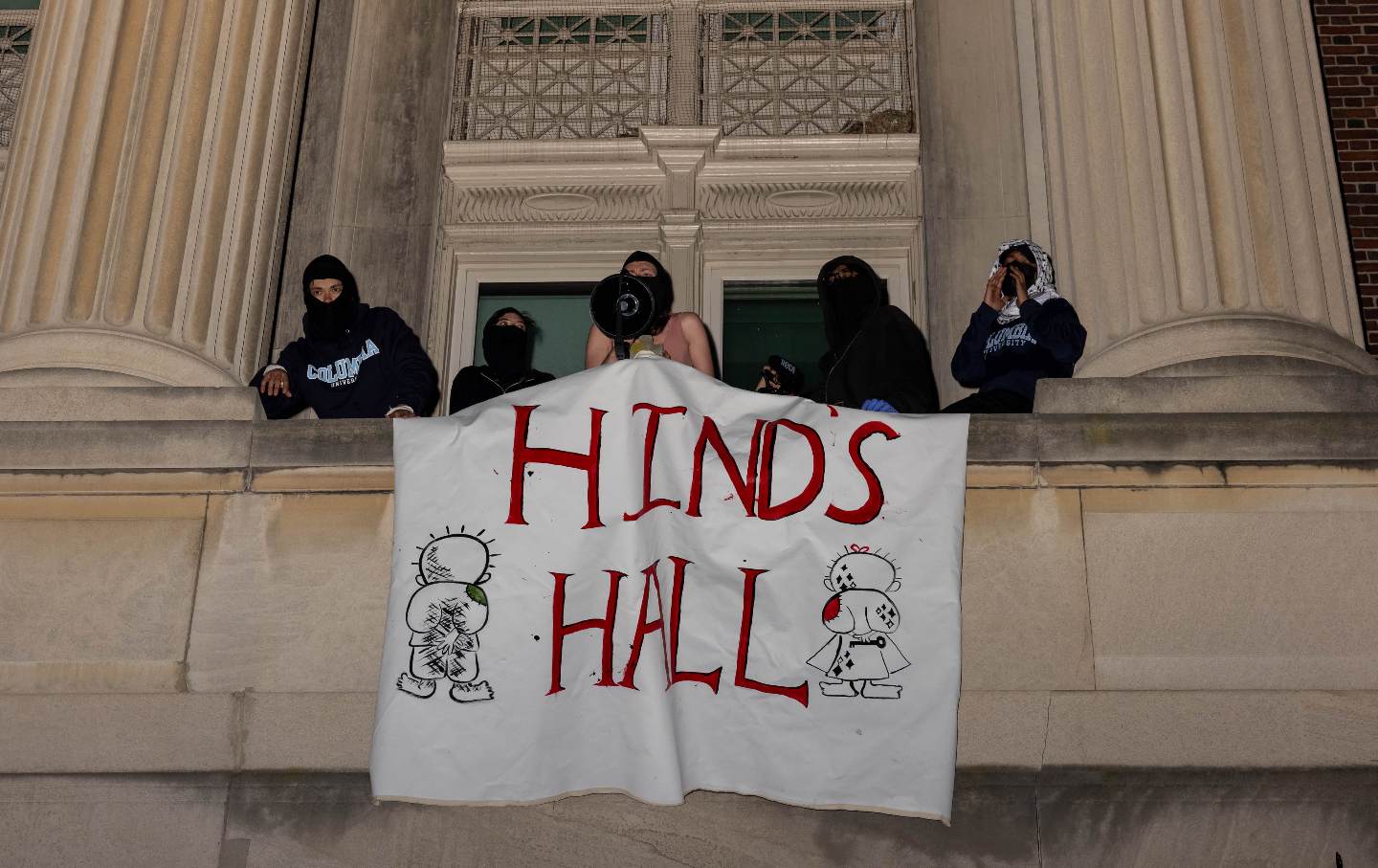
Pro-Palestine students have taken over the same building that anti-Vietnam War and anti-gentrification protesters occupied in 1968.
StudentNation
/
Lara-Nour Walton
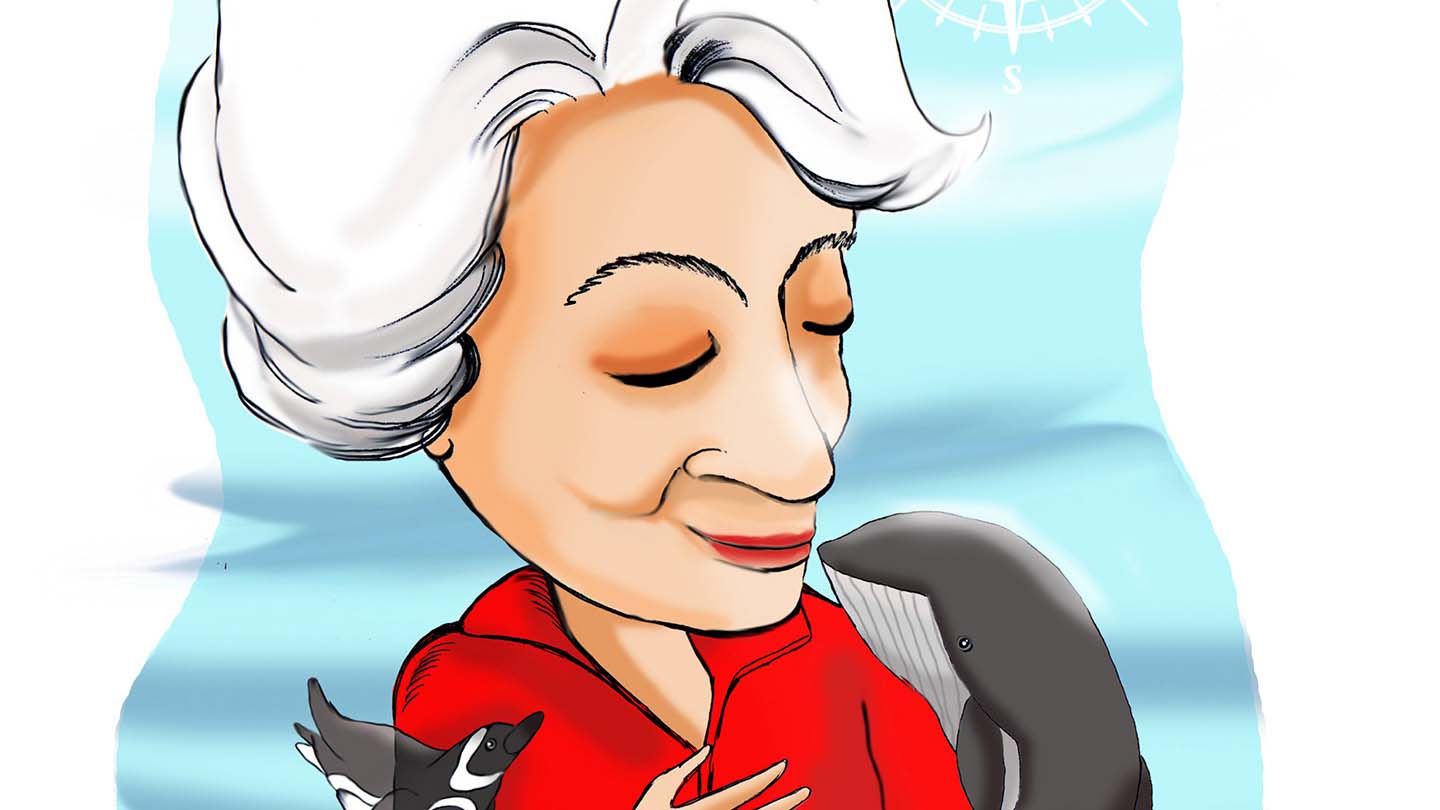
Josefina Castellví (1935), Spanish oceanographer, biologist, and writer. Maria Andresa Casamayor (1720- 1780), Spanish mathematician. Margarita Salas (1938-2019), Spanish biochemis…
OppArt
/
Adriana Mosquera Soto
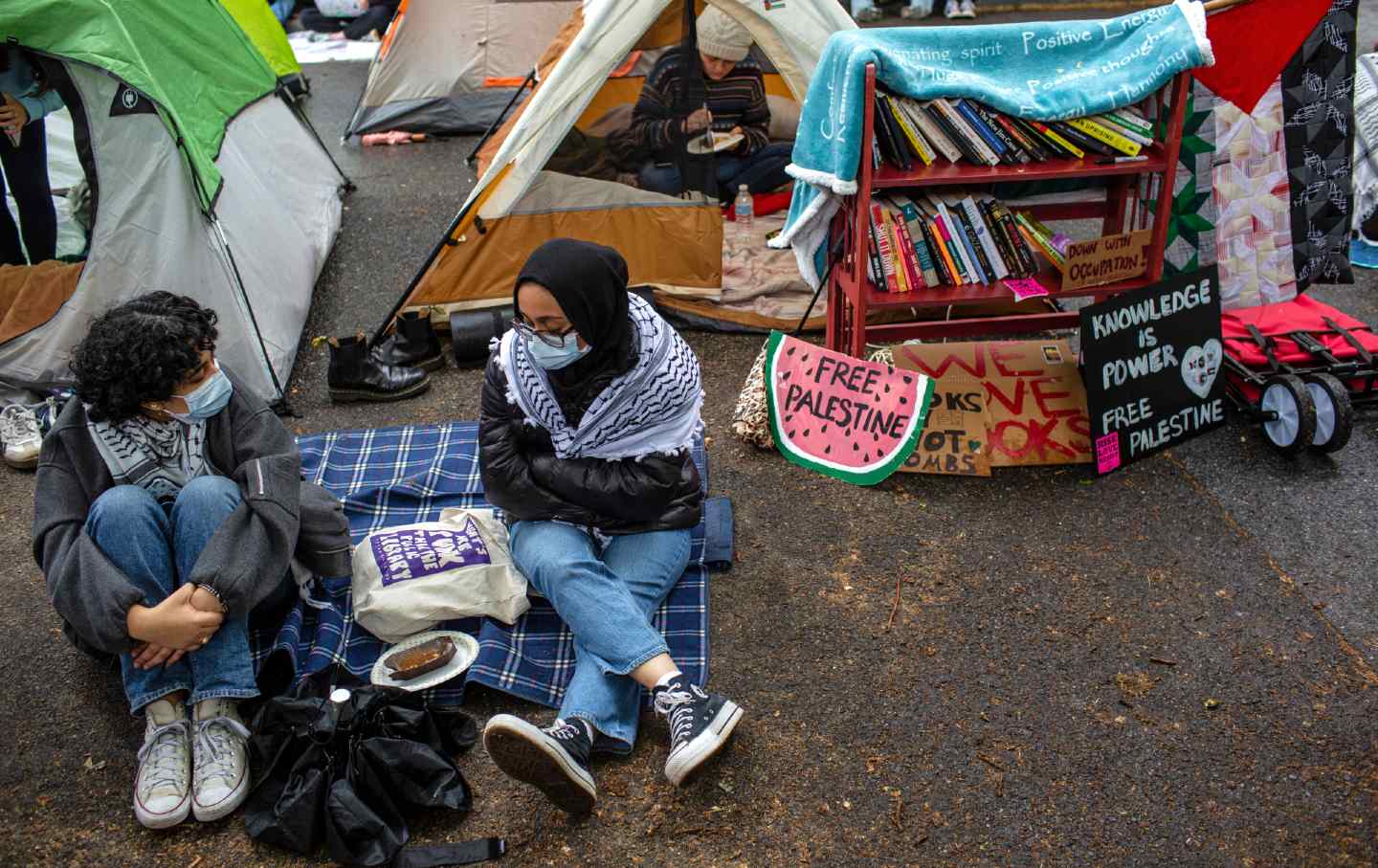
Gen Z is exhibiting the competence, control, and commitment that it has been castigated, as a generation, for lacking.
Soraya Chemaly
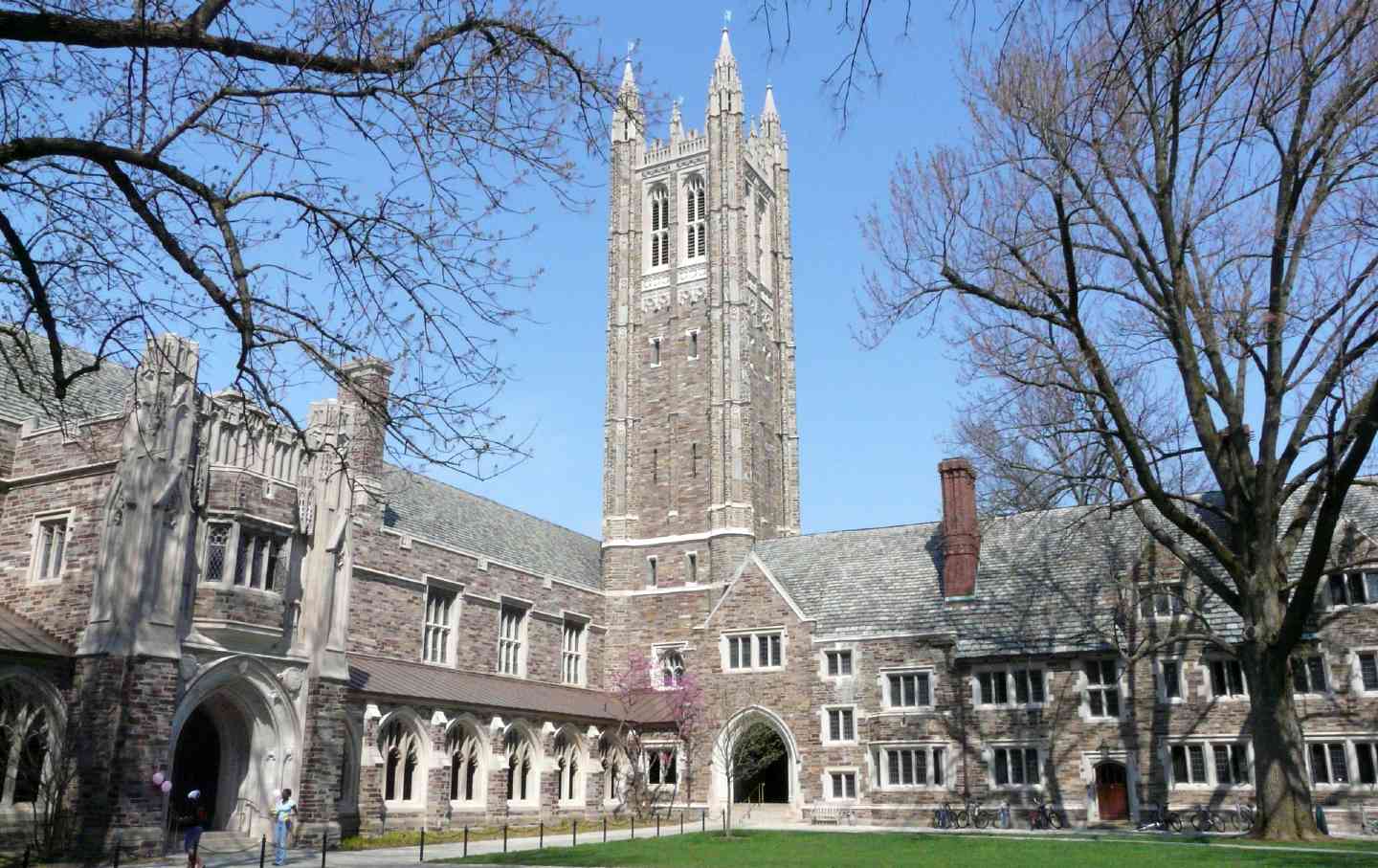
The attempts to intimidate students underline something ominous: the erosion of democratic principles.
Razia Iqbal

